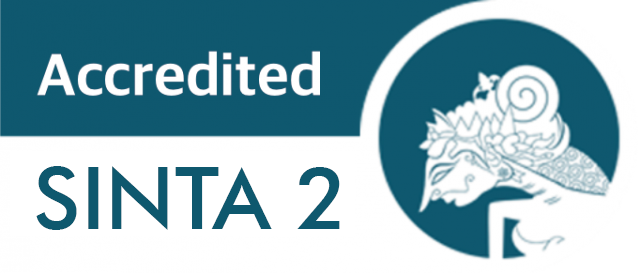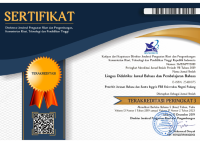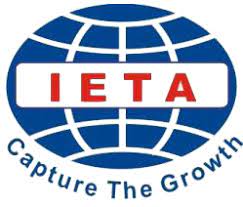Investigating Cognitive Levels Progression Applied to English as a Foreign Language Acquisition Learning among Secondary Schools Learners in Parakou, Benin
 ),
), (1) University of Parakou in Republic of Benin
 Corresponding Author
Corresponding Author
Copyright (c) 2024 Lingua Didaktika: Jurnal Bahasa dan Pembelajaran Bahasa
DOI : https://doi.org/10.24036/ld.v18i2.125530
Full Text:
 Language : Anglais
Language : Anglais
Abstract
Les niveaux cognitifs des élèves sont très importants dans les cours d'EFL. Ils déterminent la maîtrise des enseignements ainsi que la réalisation du processus d'apprentissage pédagogique. Cette recherche a pour objectif d'évaluer les différents niveaux cognitifs des apprenants en anglais. Lycée Mathieu Bouké de Parakou au Bénin a constitué le cadre de recherche. Les enseignants et les apprenants ont été sélectionnés dans un échantillon pour participer à l'étude. Ils ont été sélectionnés de manière aléatoire. Questionnaires, entretiens, observations de classe et évaluation cognitive de Montréal (MoCA) ont été utilisés pour collecter des données, qui ont été traitées selon des approches qualitatives et quantitatives. Les résultats ont démontré que 40% des enseignants rencontrés ne connaissent rien aux niveaux cognitifs, 50% ne savent pas quelles activités cognitives ils doivent proposer aux élèves en fonction de leurs niveaux. Seuls 30 % en sont conscients et stimulent réellement la cognition. Par ailleurs, 80% des apprenants ont une compréhension rapide et 20% ont une compréhension faible ou moyenne des enseignements. Ces observations peuvent être dues à la technologie et aux pratiques socioculturelles qui peuvent influencer positivement ou négativement la capacité de retention. L'étude a mis en évidence six niveaux cognitifs classiques. Ces niveaux cognitifs dans le processus d'enseignement-apprentissage peuvent aider les apprenants à mieux améliorer les quatre compétences.
Keywords
References
Al-Munawwarah F. S. (2018) Students’ Motivation In EFL Learning. TELL-US Journal, 4(2), September 2018, 107-119. : https://doi.org/10.22202/tus.2018.v4i2.2779
Cawley, J. Heckman J.& Vytlacil E. (2001). Three observations on wages and measured cognitive ability. Labour Economics, 8 (4), 419-442.
Crew, V., & Bodycott, P. (2005). Value- added approaches to study abroad: Reality Vs. intuitive judgements, presented at Redesigning Pedagogy International Conference: Research, Policy, Practice, May 2005, Singapore. Retrieve from http:// repository. lib.eduhk.hk/jspui/handle/2260.2/193
Crisfield, E., White, J., &Pawlak, M. (Ed). (2012). New perspectives on individual differences in language learning and teaching. London: Springer Heidelberg.
Engle, R. W., Tuholski, S. W., Laughlin, J. E., & Conway, A. R. A. (1999). Working memory, short-term memory, and general fluid intelligence: A latent-variable approach. Journal of Experimental Psychology: General, 128 (3), 309-331.
Erikson, M. G., & Erikson, M. (2019). Learning outcomes and critical thinking - good intentions in conflict. Studies in Higher Education, 44 (12), 2293-2303. https://doi.org/10.1080/03075079.2018.1486813
Evendi E., Al Kusaeri A.K., Pardi M.H.H., Sucipto L., Bayani F., Prayogi S. (2022) Assessing students’ critical thinking skills viewed from cognitive style: Study on implementation of problem-based e-learning model in mathematics courses. EURASIA Journal of Mathematics, Science and Technology Education, 2022, 18(7), 1-15. https://doi.org/10.29333/ejmste/12161
Evendi, E., & Verawati, N. N. S. P. (2021). Evaluation of student learning outcomes in problem-based learning: Study of its implementation and reflection of successful factors. Jurnal Penelitian Pendidikan IPA, 7(Special Issue), 69-76.
Finn A.S. Kraft M.A. West M.R. Leonard J.A. Bisch C.E. Martin R.E. Sheridan M.A. Gabrieli C.F. & Gabrieli J.D. (2014). Cognitive skills, student achievement tests and schools. Psychological Science, 25(3), 736-744.
Jaeggi S. M. Buschkuehl M. Jonides J. and Shah P. (2011) Short- and long-term benefits of cognitive training. Psychological And Cognitive Sciences, 108(25) 10081–10086.
Green, D. A., & Riddell, W. C. (2003). Literacy and earnings: an investigation of the interaction of cognitive and unobserved skills in earnings generation. Labour Economics, 10(2), 165-184.
Idrisa F. Hassana Z. Ya’acoba A. Gillb K.S. & Mohd Awalc N. A. (2012) The role of education in shaping youth’s national identity. Social and Behavioral Sciences 59 (2012) 443 – 450
 Article Metrics
Article Metrics
 Abstract Views : 117 times
Abstract Views : 117 times
 PDF Downloaded : 53 times
PDF Downloaded : 53 times
Refbacks
- There are currently no refbacks.
Copyright (c) 2024 Lingua Didaktika: Jurnal Bahasa dan Pembelajaran Bahasa

This work is licensed under a Creative Commons Attribution-NonCommercial 4.0 International License.









